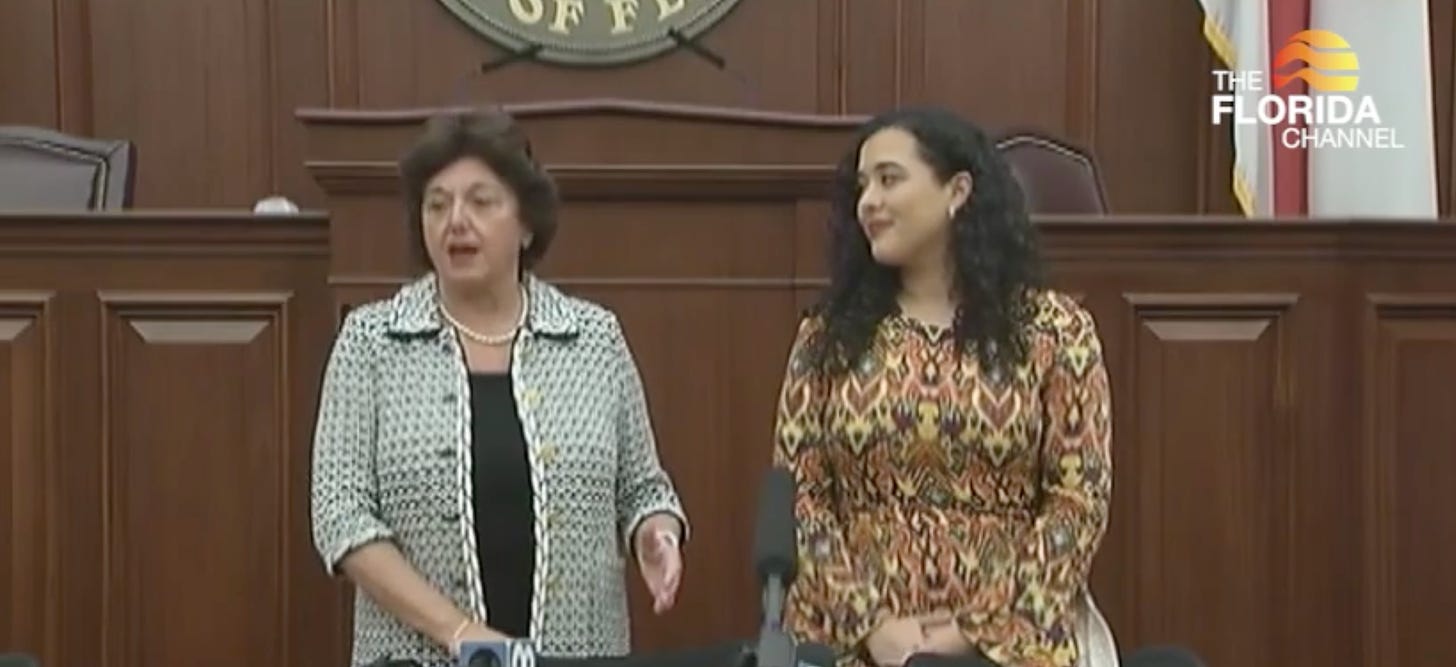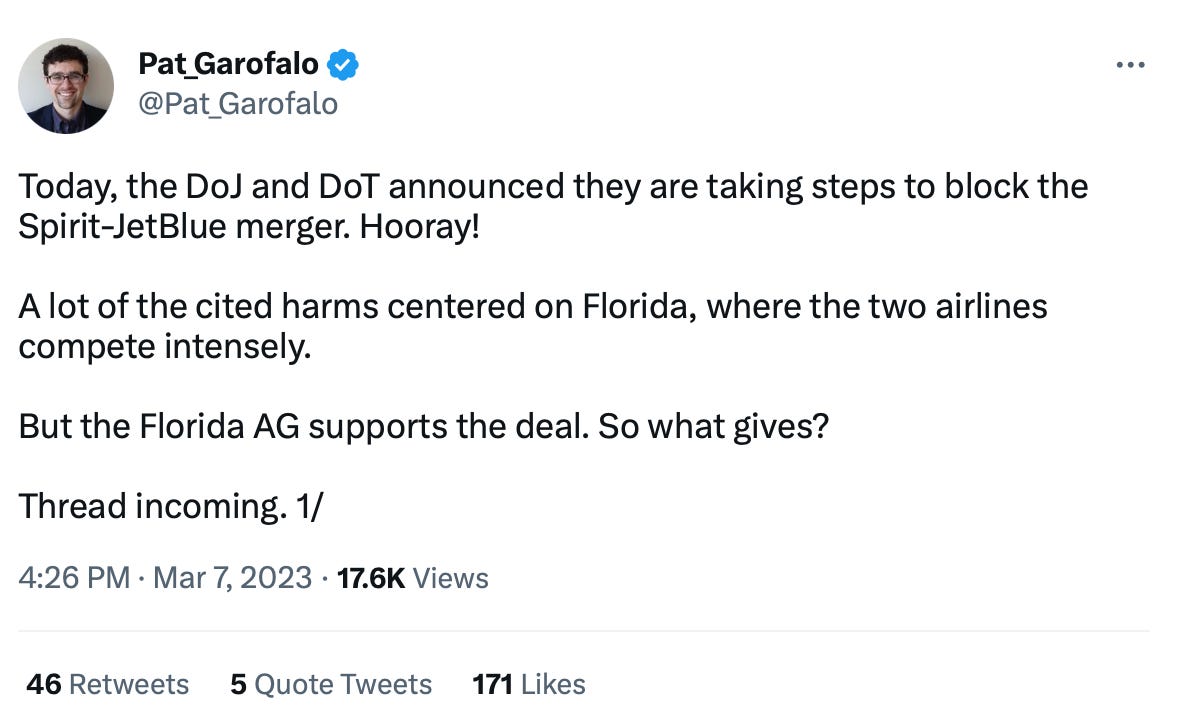Florida leaders may offer protection...to Jeff Bezos and Elon Musk
The Trade Show (2023 ed.), Vol. 8

This is “The Trade Show,” a weekly collection of shorter news nuggets and stories from other outlets around the state and country about the special interest-driven issues that lawmakers spend most of their time working on. The name comes from something a mentor once told me before I covered my very first session of the Florida Legislature more than 20 years ago: “Ninety percent of what goes on up here is a trade show.” As always, our content here at Seeking Rents is free to all readers. But please consider a paid subscription to support our work, if you can afford one.
Blue Origin and SpaceX, the billionaire-backed private space companies, could get protections from wrongful-death lawsuits following an explosion that kills their crew — even if their own carelessness contributed to the accident.
The Florida House of Representatives’ Civil Justice Subcommittee advanced a bill last week (House Bill 839) that would shield private spaceflight companies from civil lawsuits brought by or on behalf of any crew members injured or killed in an accident. The far-reaching liability protections would also insulate the companies against lawsuits from any other employees, contractors or subcontractors who work on launch or reentry operations. All the companies would have to do is make their employees sign a waiver.
The legal immunity would cover accidents caused by the “inherent risk” of spaceflight. But it would also protect the companies even when their own negligence contributes to the accident. Employees of their family members could only bring lawsuits if the companies were “grossly negligent.”
(The difference between “negligence” and “gross negligence” is basically the difference between “careless” and “reckless.”)
Lobbying records show that Blue Origin, the company started by Amazon.com Inc. founder Jeff Bezos, was the first company registered to lobby on the legislation. Blue Origin was later joined by SpaceX, the company led by Tesla founder and Twitter chief Elon Musk. Both have operations at Cape Canaveral.
The Washington Post just dropped the first must-read story of the session
An investigation by The Washington Post finds that property insurance companies in Florida “have been aggressively seeking to limit payouts to policyholders by altering the work of licensed adjusters” in the aftermath of Hurricane Ian.
“As a result, homeowners are left footing much of the bill for repairs, exposing an untenable gap between the cost of storm damage and what insurers are willing to pay to fix it,” the newspaper reports.
This investigation lands three months after Florida Gov. Ron DeSantis and the Republican-controlled Florida Legislature made it much harder to sue an insurance company that improperly underpays or denies a claim.
Read: Insurers slashed Hurricane Ian payouts far below damage estimates, documents and insiders reveal (The Washington Post)
A new tax break for an old greenhouse gas
Another the special interest tax break is on the move in the state Capitol.
A committee in the Florida Senate last week approved Senate Bill 844, which would eliminate sales tax on equipment used in the production of so-called “renewable natural gas” — which is also known as “biomethane” and comes from sources like cow manure, sewage and landfill gas.
Records show the tax break originally came to the Legislature from Chesapeake Utilities Corp., a Delaware-based power company that is building an RNG plant at a dairy cattle operation in North Florida.
The tax break approved by the Senate committee last week is virtually identical to language that a Chesapeake lobbyist provided to legislative staffers during last year’s legislative session. Chesapeake has had an assist from the Florida Natural Gas Association, a trade group that also represents companies like Peoples Gas, an affiliate of TECO, and Florida City Gas, an affiliate of Florida Power & Light.
Analysts estimate the tax break will cost the state about $1 million a year in lost sales tax revenues. Chesapeake, which also owns Florida Public Utilities Co., turned a $90 million profit last year.
Chesapeake isn’t the only company that would benefit from this break. Peoples Gas — the TECO affiliate that is ultimately owned by Canadian power conglomerate Emera Inc. — is also pursuing RNG projects in Florida, using both cows and landfills.
The tax break is similar to one that FPL lobbied through the Legislature last year for what the industry calls “green hydrogen” — a fuel that is sometimes green but often is not. That break was forecast to save FPL more than $2 million in sales taxes on a new plant it is building in Okeechobee County.
Boosters say they want to stimulate the growth of the renewable natural gas industry in Florida. Senate sponsor Clay Yarborough (R-Jacksonville) told the Senate Commerce and Tourism Committee that Florida has the “potential” for 375 new RNG projects that together could create more than 9,000 temporary construction jobs and more than 600 permanent jobs.
Of course, RNG projects are already starting to happen in Florida even without this tax break.
And then there’s the question of whether we should be propping up RNG at all. Because while it has “renewable” in its name, RNG is an exceptionally dirty source of energy. Methane accounts for an estimated 30 percent of global temperature change since industrialization, according to the International Monetary Fund.
The call is coming from inside the house
Ron DeSantis’ brute-force attempt to turn tiny New College of Florida into a conservative classical school has garnered national attention. But the governor may be doing something similar — but more subtle — at Florida’s flagship university, too.
As part of this broader effort to exert more control over the state university system, DeSantis has called for turning a newly established center at the University of Florida into a semi-autonomous college, complete with its own dorms, classrooms and a more-conservative-minded faculty and student body.
DeSantis wants to elevate the “Hamilton Center for Classical and Civic Education” to college status just one year after the center was started with $3 million in seed money from the Florida Legislature. Lawmakers stuffed the earmarks into the state budget following an unusually successful lobbying campaign by a mysterious nonprofit.
Emma Pettit, a reporter at The Chronicle of Higher Education, recently discovered new details about this murky origin story. Pettit obtained public records that show the plan laying out the vision — and the legislation — for the Hamilton Center was first shown to top officials at UF by a former chief of staff to DeSantis who has since jumped to a lobbying job at a firm run by one of DeSantis’ biggest fundraisers.
The records also show that a senior UF administrator was, at least initially, highly skeptical. “It lays out a conservative agenda to influence the curriculum that may not be well-received,” he wrote in a response to the plan pitched by the DeSantis aide-turned-lobbyist.
Meanwhile, just like New College, which DeSantis and the Legislature are showering in money now that it is under new, right-wing leadership, the UF Hamilton Center is about to be swimming in cash, too. DeSantis has asked the Legislature to give the Hamilton Center another $18 million this year; a budget request has already been filed in the Florida House for $20 million.
Read: How a center for civic education became a political provocation (The Chronicle of Higher Education)
Florida tries to fill a gap in housing but ignores a gap in healthcare
Just one day after gaveling opening the 60-day legislative session, the Florida Senate unanimously approved Senate President Kathleen Passidomo’s mammoth affordable housing plan — a $1 billion-plus package of direct spending and tax breaks that supporters hope will spur mass construction of affordably-priced apartments across the state.
While many of the subsidies are meant to support housing for low-income Floridians, Passidomo’s plan also includes a new tax break aimed at folks a little further up the economic ladder.
Dubbed the “Missing Middle,” it would offer property tax breaks to owners of new or recently built, market-rate apartment complexes who agree to rent units out at rates that are affordable to people making up to 120 percent of the median income in their area — which could be as much as $94,000 a year for a family of four.
Passidomo (R-Naples) is clearly passionate about this. “Right now, we’re in a crisis,” she told reporters Wednesday, shortly after the Senate passed her housing plan on a 40-0 vote. “And we’ve got to do something, particularly for the missing middle — the people that make too much to qualify for the current programs and too little to actually be able to afford a place to live.”

That’s great to hear.
But it’s also the exact problem that Florida leaders have been ignoring for years in healthcare, where hundreds of thousands of Floridians have been languishing for years in a health insurance coverage gap created by Florida’s refusal to expand Medicaid under the Affordable Care Act.
Because Florida won’t expand eligibility for Medicaid, hundreds of thousands of Floridians have been left in limbo. They make too much to enroll in the state’s limited public program but not enough to qualify for private-market subsidies from the federal government.
Many of these folks gained coverage during the COVID-19 pandemic, thanks a temporary Medicaid expansion funded by the federal government. But they’re about to fall right back into the coverage gap once Florida starts culling 900,000 or more people from Medicaid next month.
It doesn’t have to be this way. While Florida fiddles, Republicans in North Carolina are about to make the Tar Heel State the 40th state in the country to expand Medicaid.
Read: North Carolina Medicaid expansion consensus moves forward (Associated Press)
Fewer choices forever in exchange for a temporary and toothless promise
Florida Attorney General Ashley Moody announced last week that she’d secured promises of more jobs and flights from JetBlue Airways Corp. as part of its attempted $4 billion takeover of Fort Lauderdale-based Spirit Airlines Inc. — the same merger that U.S. Attorney General Merrick Garland is suing to block.
But those promises sure look pretty flimsy:
The developer lobby is hard at work
There are a whole bunch of pro-developer pieces of legislation on the move this session. The Miami Herald recently dove into them.
Read: As culture wars get attention, legislators seek control of local water, growth rules (Miami Herald)
Electric power and electoral politics
A couple of interesting reads about Florida’s power companies published last week.
Read: Electric bills are going up in April. Here’s by how much. (Orlando Sentinel)
and
Read: DeSantis lets electric companies hide their dirty work (The Lever)
Watching a rerun
The Florida House of Representatives has introduced a bill to eliminate Enterprise Florida, the state agency that helps businesses squeeze public subsidies out of taxpayers.
Might not want to hold your breath on this one, though.
Read: Florida speaker vows to clean up business slush fund. We’ve heard this before. | Commentary (Orlando Sentinel)
Good news for local journalism in Florida
You don’t have to look hard to find bad news about the newspaper industry. Just last week, the NiemanLab at Harvard University revealed that the country’s biggest newspaper chain — Gannett Company Inc., whose papers include the Palm Beach Post, Florida Times-Union, Sarasota Herald-Tribune and Tallahassee Democrat, among many others — has cut half its jobs in just the past four years.
But there’s some exciting stuff happening at the local news level, too. The Tributary in Jacksonville is an aggressive local watchdog that regularly breaks big stories.
The Florida Center for Government Accountability is helping news organizations around the state pull public records out of the DeSantis administration and other government agencies, while also underwriting impactful original reporting.
And now there’s this: Former Orlando Sentinel investigative reporter and editor Beth Kassab, one of the top journalists in Florida, announced last week that she’s taking over as editor of the Winter Park Voice, a nonprofit news publication in suburban Orlando.
So, sure, read this: The scale of local news destruction in Gannett’s markets is astonishing (NiemanLab)
But then read this: Why local news matters and how you can help (Winter Park Voice)







